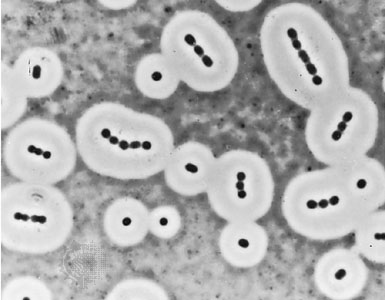
Bacterial Capsule: structure, function and examples of Capsulated bacteria
Capsule
- Capsule is 0.2µm thick viscus layer firmly attached to the cell wall of some capsulated bacteria.
- If capsule is too thick it is known as slime.
- Slime layer are loosely attached to cell wall and can be lost on vigorous washing and on sub culture.
- Composition of capsule: 98% water and 2% polysaccharide or glycoprotein/ polypeptide or both.
- In case of Acetic acid bacteria, capsule is composed of homopolysaccharide (hemicellulose)
- leuconostoc: capsule is composed of cellulose, consisting of glucose or fructose.
- Klebsiella pneumoniae: capsule is made up of glucose, galactose,rhamnose etc.
- In Bacillus anthracis: capsule is made up of Polypeptide (Polymer of D-glutamic acid) and in Streptococci, it is L-aminoacids.
- Capsule is very delicate structure. It can be removed by vigorous washing.
- Capsule is most important virulence factor of bacteria.
- Capsule in visualized by Negative staining technique

There are two types of capsule.
- Macro-capsule: thickness of 0.2µm or more, visible under light microscope
- Microcapsule: thickness less than 0.2µm, visible under Electron microscope
Function of capsule:
- Prevent the cell from desiccation and drying: capsular polysaccharide bind significant amount of water making cell resistant to drying
- Protection: it protect from mechanical injury, temperature, drying etc
- Attachment: capsule helps in attachment on the surface. Eg. Streptococcus mutants that cause dental carries attach on teeth surface by its capsule.
- Anti-phagocytic : Capsule resist phagocytosis by WBCs
- Capsule prevent attachment of bacteriophage on cell surface
- Source of nutrition: capsule is source of nutrition when nutrient supply is low in cell.
- Repulsion: same charge capsulated bacteria repel each other.
Examples of Capsulated bacteria:
Bacillus subtilis
Bacillus anthracis ( contains polypeptide capsule)
Streptococcus pneumoniae
Klebsiella pneumoniae
Haemplhilus influenza
Clostridium perfingens
Neisseria meningitidis
Pseudmonas aeruginosa
Acenetobacter calcoaceticus
